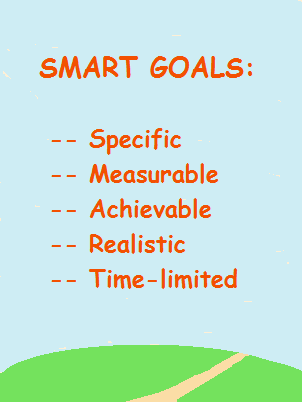Learning English Online: Make a Plan
Learning English online is possible, but you need a good plan to stay on track. There's a lot of help is available at different levels. You can choose what is most helpful to you as your English improves.
Successful Learning Starts with a Plan
Is your goal to study or work in an English-speaking country? Do you need to pass an important admissions exam or professional test? Do you need good English for business or professional communication (or for personal reasons)?
In each case you need a specific plan for your English studies. It can get you from what you already know to what you want to be able to do in English.
So how can you start? You already understand quite a bit of English if you have read this far (unless you used translation!)
So start by evaluating what you already know, what you want and need to learn, and how you learn best.
Some people learn best by seeing, using actual or mental pictures. Others need to hear and can benefit from podcasts, songs, and repeating words or phrases aloud. Physical action (even just writing words down) helps others. Try different techniques to find your own learning style-- then use what works for you!
Individualize your plan based on your interests and the time you have available. One advantage of studying online is that there are so many approaches to choose from. No one website will be best for everyone, and no one site will have all YOU need. Check out the many resources available!
Develop Your English Speaking Skills can help if you need to speak with English-speaking colleagues or clients. It has suggestions for improving your pronunciation, vocabulary, conversational and business skills. It also has information about the individual lessons I offer.
Find resources, especially if you're still working on some of the basics of English, at Free Resources for English Language Learners.
It suggests good sites for general lessons (or review), and sites (or pages on EnglishHints) for grammar, vocabulary, idioms, and skills practice including writing. It also links to sites that have games, apps, and listening materials for all ages, including children.
Find sources for various kinds of reading at Online Reading and Find English Reading Materials. There are some for listening and speaking at English Conversation Practice and English Listening Practice.
See also Learn English Free and Study English Online. Learning Hacks has some strategies to improve your memory and the effectiveness of your practice.
If you would like more personalized help, I can work with you to design a study plan. We can plan lessons in the areas where you would like a little extra help. I specialize in writing and academic vocabulary, but I would be glad to help in other areas too. See How to Improve Your English.
Set SMART goals:
Specific:
>Exactly what do you still need to study? Academic vocabulary? English sentence structure? Reading comprehension? Decide what’s most important to focus on.
Measurable:
>It’s important to be able to see your progress. Take a test or read a difficult article now, then again after studying for a while. See how much you have learned! (Check out the quizzes and tests in ESL Quizzes for before and after measurements.)
Achievable/Attainable:
>You can learn English-- but only if you think you can! Do consider the limits on your time and capabilities when you plan. Choose a goal you know is possible in the next few months. When you reach it, you’ll be more motivated to keep going than if you aim too high at first.
Realistic or Relevant:
>Are you willing to put in the time and effort needed to reach the goal you set? If not, choose a goal you can actually keep working toward, week after week. It helps to set easier short-term goals along the way.
For example: "I want to study Animal Farm by George Orwell so that in 2 weeks I can write a paper about it." (or) "I want to practice making business calls in English. I'll rehearse ome calls with my friends. Then when I get promoted, I will be confident I can do it.
Also, is your goal relevant-- related to what you really want from life? If you set a goal just because someone else thinks you should or it sounds good, it will be hard to keep working for it.
Time-Limited:
>Set definite time limits. (See the short-term goals above.) How often do you plan to practice? For how long? When do you plan to reach your goal?
Examples of SMART goals:

“I will study with Voice of America 4 days a week. After 3 months I will retake tests from three of the lessons I studied, and will get 85% or more of the questions right.” (Low Intermediate.)
“I will practice reading at least four English-language news article a week. In 6 months I will be able to write a summary of two articles in the New York Times. I'll ask an American friend to check them for accuracy.” (High Intermediate or Advanced.)
You can use resources on EnglishHints for several goals, such as:
“I will study for the TOEFL exam (or the IELTS or SAT) for ½ hour a day, five days a week for three months. I can use the reading and listening practice in Comprehension Exercises and the writing exam practice in Learn to Write English. At the start and end, I will take the same practice test on the official TOEFL (or IELTS or SAT) site to measure my progress." (High Intermediate.)
“I will subscribe to English Detective to practice academic vocabulary and comprehension. I'll read at least two articles a month and practice any new vocabulary. Before beginning and after 4 months, I will take the same vocabulary test and see how much I have improved.” See Building Vocabulary Week by Week for more details on English Detective. (Intermediate up.)
“I will learn English word building skills and the roots and prefixes that make up so many words in English.” (See Word Families, Roots, Prefixes, and Suffixes, and the pages they link to.)
Study English Online can help you make a plan and organize your study time. Find the best order to study and practice the English you need based on your level and goals. If you're a scientist, researcher, or other professional, you might also be interested in occasional emails with English tips especially relevant to you.
Short, frequent practice sessions are much better than long sessions once a week. (In some ways our minds are like muscles-- frequent use makes them stronger. Would you prepare for a sports event by practicing for three hours once every two weeks?)
Practice Speaking; Don't Just Study
There is no substitute for talking to people in English when you can. Talking face to face, you can see a person’s expressions and gestures. It's easy to match them with the rhythms of their English. It’s also easier to notice their word stress and the feelings behind the words. Seeing and hearing in person (or watching good-quality video) is important in learning any language. It's almost essential for understanding humor or attitudes.
What can you do if you are not in an English class and don’t have any English-speaking friends? English Conversation Practice has suggestions for finding practice partners. It can help you find opportunities to practice English in non-stressful situations.
Practice is vital, whether in person or online. The more listening and reading you can do, the better you will learn the words and patterns of English. Studying grammar and vocabulary can help, but only listening and reading A LOT—will make it yours.
Learning English is a long-term project. It's an investment in your future that is well worth the time and effort it takes. It can help to have a teacher. But at best, a teacher can provide you a road map-- hints about the best way to get where you need to go. You have to do the traveling yourself. As an old cowboy show used to close, “Happy trails to you!”
Didn't find what you
needed? Explain what you want in the search box below.
(For example, cognates, past tense practice, or 'get along with.') Click to see the related pages on EnglishHints.
| site search by freefind | advanced |






